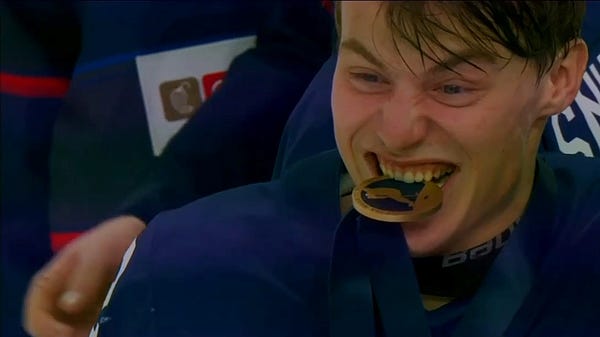Interlude: Outlasting the NTDP, or the Seamus Casey Game
Seamus Casey, making a cameo as a center, carries Michigan past the NTDP by a 7-6 final. Odds & Ends feature a ‘23 WJC wrap and a quick word on the future of the GLI
For email subscribers: This perhaps doesn’t come as a surprise, but we have once again eclipsed Substack’s email limit. If you normally read the newsletter in your email inbox, you will want to press “view entire message” or a button that reads something like that to make certain you have your full serving of Gulo Gulo Hockey for the weekend. You can also always pull up the newsletter on gulogulohockey.substack.com if that’s easier. We apologize for any inconvenience and very much appreciate your readership and subscription.
At midday yesterday, Brandon Naurato feared his team wouldn’t have enough available bodies for the evening’s exhibition contest with the U.S. National Team Development Program. The World Juniors left Michigan’s roster critically thin, so when two more players fell unavailable late in the week, the interim head coach worried that playing a game last night might be irresponsible.
Enter Seamus Casey.
The freshman defenseman was en route back to Ann Arbor from the World Juniors in Halifax. None of the six Wolverines who featured in the WJC were slated to play in the evening’s game, but because Casey had remained a reserve for Team USA (appearing only in the pre-tournament games), Naurato asked if he could go that evening.
Casey agreed, but asked if he could play forward. Naurato thought that sounded good and slotted him into the team’s top line between Jackson Hallum and Mackie Samoskevich.
The freshman and his Team USA teammates had been on the go since 6 AM Atlantic (5 AM Eastern) when they left their hotel in Halifax. After a layover at Toronto’s Pearson Airport before a flight back to DTW, Casey estimates that he made it to Yost around 2:45. Some four hours after that, he took the ice as Michigan’s number one center, a position he estimates he hadn’t played since age thirteen or fourteen.
Casey proceeded to dominate—scoring twice, giving an assist, even winning nine of fourteen faceoffs, and altogether carrying the Wolverines to a chaotic 7-6 victory.
When asked after the game whether he was surprised by Casey’s performance at the dot in particular, Naurato smiled. “Was I surprised by it? Yeah, but Seamus does some crazy stuff.” Though ostensibly he was talking about Casey’s work at the dot, it’s hard not to extrapolate the comment out to the totality of his performance.
After the Wolverines conceded an early goal to Alex Weiermair following some disastrous puck management deep in their own end, Casey got his team on the board by deflecting home a Hallum bid from the high slot.
That Casey scored on a deflection—a play that would seldom present itself to him from his normal spot along the blue line—provided the first signal that his cameo as a center might be a fruitful one.
With the Wolverines down two in the second, Casey showed his trademark slipperiness with the puck in the corner, and after a brief exchange with Hallum, fed Samoskevich at the goal mouth. Samoskevich had the puck off his tape and into the back of the net in an instant.
The combination of Samoskevich and Casey was devastating all night. The former spent the whole evening hunting out one-on-one situations, his smooth stride and slick hands belying the ruthlessness with which he terrorized NTDP defenders. The latter showed that his unassailable ability to shave ice—cutting back and buying himself an extra half-second to find and make a play whenever necessary—translated to new areas of the rink in his temporary new role.

Michigan wouldn’t score again until the third, but it spent most of the second establishing territorial supremacy over the U18s, enjoying several prolonged stays in the offensive end of the rink.

Still, the Wolverines entered the third trailing 3-2. Through forty minutes, they were uncharacteristically turnover prone (perhaps a reminder of the long layoff between the exhibition and the Michigan State game that concluded the first half) but seemingly able to play through the NTDP at will.
The game exploded in the third, with the home team repeatedly appearing on the precipice of levying a decisive blow only to allow their guests back within striking distance. Michigan scored five times in the final stanza, while spotting the NTDP three in return.
This process began six minutes into the frame, when Casey leveled the score with his second of the night and wouldn’t end until West stonewalled an NTDP 3-on-0 with 1.4 seconds to play.
On an evening with plenty of candidates to choose from, it was perhaps Casey’s finest moment—winning a puck battle along the boards, toe dragging around a defender, then beating NTDP netminder Michael Chambre with a backhand.
Captain Nolan Moyle lifted the Wolverines to their first lead of the game when he deflected home an Ethan Edwards point shot not long after the midway point of the third. Not quite two minutes later, freshman Kienan Draper gave the hosts a two-goal cushion.
The goal was a well deserved reward for a player and line that impressed throughout the evening. With Mark Estapa and Eric Ciccolini (the latter playing in his first game since November) on his wings, Draper took advantage of the uptick in minutes he received as a result of the undermanned forward unit.
“We rolled everyone on the PK, everyone on the power play, everyone five-on-five, so the minutes should be pretty even,” explained Naurato after the game. “I thought it was a great opportunity for those guys to step up and get some bigger minutes and show what they can do on special teams. Good for Drapes and a lot of those guys.”
Estapa played one of his strongest games of the season, looking dangerous in transition and combining well with Ciccolini on numerous occasions to stretch the rink and create space. The crispness of Ciccolini’s passing stood out, an especially impressive feat considering his long layoff. Beyond scoring, the unit spent several extended passages of play in the NTDP end of the rink.
The two-goal lead lasted just two minutes and four seconds though, before Aram Minnetian brought the score back to 5-4, only for Samoskevich to restore the Wolverines’ cushion forty-two seconds after that.
After Will Smith scored to bring the score to 6-5, Ciccolini appeared to ice the game with an empty netter with 1:25 to play. However, a second from Smith thirty-three seconds later kept the game alive a little longer.
Michigan afforded its callow guests one last opportunity with just seconds remaining, forcing Noah West (who came on in relief of Erik Portillo midway through the second period) to stonewall a 3-on-0 and seal the 7-6 final.

In all, it was a performance that reflected its circumstance. As Naurato said postgame, “With the number of guys [available] and we haven’t played a game in a month, [The NTDP] played Minnesota and North Dakota last week, I thought we managed it pretty well.”
Michigan showed a certain sloppiness or rust that squares with playing under-manned after a month out of game action, but that didn’t mean there weren’t positives to take away from the evening.
One clear bright spot from the evening was the debut of freshman defenseman Brendan Miles. “I was a little nervous before stepping in,” said Miles, reflecting upon the moment postgame. “But as soon as the first shift, second shift was over, it felt like a normal hockey game, and I was just playing the sport I love.”
If Miles began the game anxious, it didn’t manifest in his play. The Bloomfield Hills native looked right at home amidst the Wolverine blue line—showing the kind of skating and puck-moving ability necessary to meet the demands of Naurato’s high-octane system.
Beyond the whimsy of Casey’s out-of-position brilliance, the highlight of the evening was the way the likes of Draper and Miles responded to being thrust into featured roles. Even in an imperfect effort, it was encouraging to see several young depth pieces tease greater contributions to come.
“I don’t like giving up six goals, but you want to win every game, especially when you’re in it,” Naurato said. “It was good. Everyone’s involved, everyone’s put in different situations, and it’s just next guy up, and I thought the guys did a really good job.”
It was a game that won’t count in the standings, but winning still beats losing as a segue into the Big Ten stretch run, which will commence next weekend at Yost against Ohio State.
Odds and Ends
Putting a Bow on the 2023 WJC
Congratulations to Adam Fantilli and Team Canada on winning the 2023 World Juniors via a 3-2 overtime victory over Czechia in the gold medal game Thursday. With the victory, the Canadians avenged the tournament-opening loss that spawned a brief national panic about the appropriate usage of the Michigan and claimed their second consecutive WJC.
The victory was the triumph of an uber-talented if at times ill-fitting team led by a generational talent in Connor Bedard, who put to bed any inkling of a discussion as to what name would be announced first at this spring’s NHL Draft.

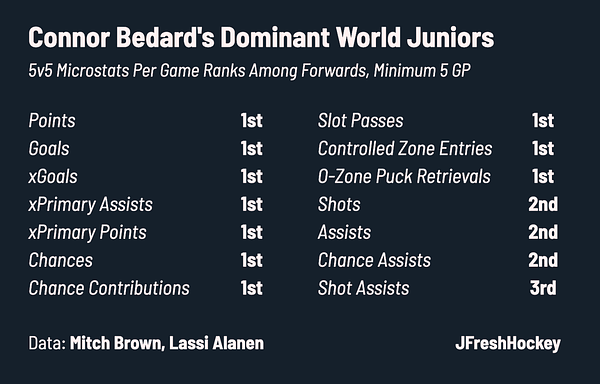
Though it ended with gold, it wasn’t an easy tournament for Fantilli. He was isolated as a scapegoat for that loss against Czechia and spent most of the tournament playing out of position as a fourth line winger.
That the Canadians could afford to win gold while turning their second best player into a mere depth piece stands in testament to the fact that sometimes your team is so good you can win without optimal tactics.
The good news, though, is that, even if closing the gap to Connor Bedard as the top prospect in the 2023 Draft is now a near impossibility (a reality that has much more to do with Bedard’s transcendence than any missteps real or imagined from Fantilli), the Nobleton, Ontario native demonstrated his readiness for the professional ranks in adapting to a depth role.

One of the major stories across the NHL this season has been the difficulty young and gifted prospects have had cementing their places in NHL lineups. Perhaps the most notable example is Fantilli’s WJC teammate and captain Shane Wright, who will return to the OHL rather than remain a healthy scratch with occasional cameos for the Seattle Kraken.
That Fantilli proved his ability to thrive in a bottom-six role will help him earn his way into an NHL lineup faster and eventually climb up it.
The best news is that Fantilli did, if only for a moment, take center stage when he scored the game-winning goal in the Canadians’ semi-final victory over his five Wolverine teammates and Team USA.
The goal demonstrated Fantilli’s command of the entire rink when he’s on the ice, sending in a banked pass for Zach Dean before racing to the net to receive and deposit the return feed. His jubilation and catharsis were evident in his celebration.

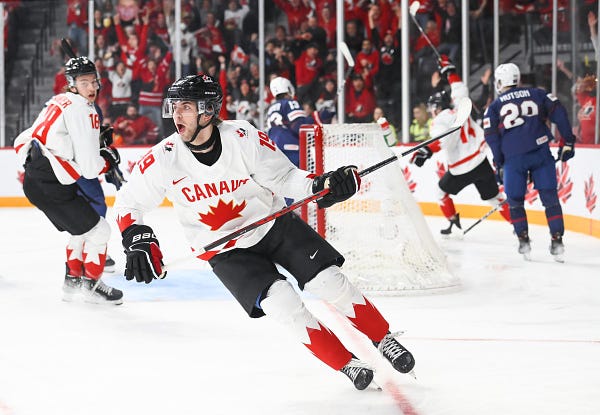
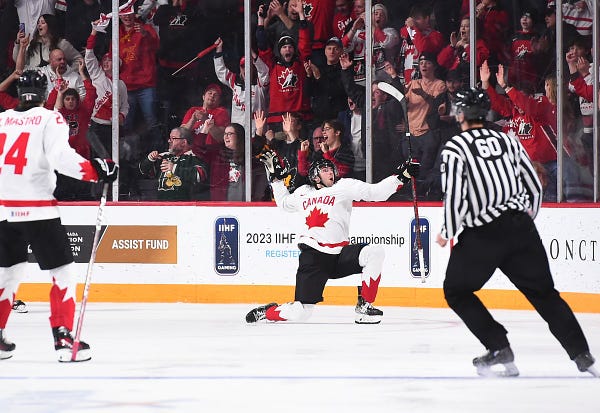
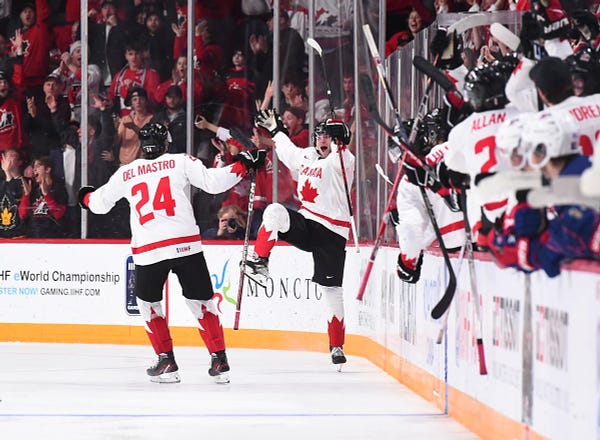
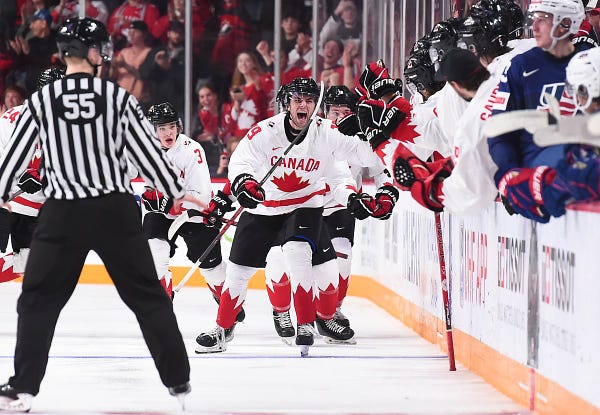
I’m so happy for Fantilli I won’t even mention the ludicrous goaltender interference call that helped facilitate the Canadians’ win over the U.S.
Fortunately, the USA contingent of Wolverines at the Maritimes secured medals of their own with an exhilarating 8-7 OT victory over the Swedes in the third place game.
Both Teams USA and Canada have a reputation for no-showing third-place games in international tournaments, apparently unsatisfied with anything but gold, but the delightfully chaotic affair between the States and Swedes concluded with a definitive sense of joy for the Americans. It wasn’t the prize they wanted, but it was an impressive tournament nonetheless amidst what was perhaps the most competitive WJC field in recent memory.
In the third period of the third place game, Luke Hughes netted his fourth goal of the tournament in spectacular fashion, earning SportCenter’s top play of the evening for his troubles.
A Note on the Future of the GLI
If the WJC is one holiday tradition at which Michigan hockey was well represented, the Great Lakes Invitational unfolded devoid of maize and blue.
According to Naurato, participating in the GLI will likely remain unworkable for the Wolverines as long as it remains in its current holiday time slot for the foreseeable future.
The reasons here are two-fold: first, the overlap with the WJC means that Michigan would almost certainly be without a handful of serious contributors and forced to compete with a dangerously thin lineup, and second, because of Naurato’s belief in the value of some time off for his players over the holidays.
The Wolverines’ undermanned lineup against the NTDP, a less severe version of the illness-ravaged one that played Minnesota earlier in the season, helps to illustrate this dilemma. As Naurato explains it, that dynamic levels the team too vulnerable should in-game injury worsen the situation even slightly (as almost derailed last night’s exhibition):
“One forward goes down, and it’s unplayable. Now you’re double shifting guys in college hockey the whole game, so every one of those guys will be around twenty minutes, if you just even out the minutes. That’s a lot, especially for some guys that are used to playing six or ten or eleven.”
The interim head coach added “The other thing is our guys for the first time got ten to twelve days off with their family and a mental recharge. Everyone talks about mental health, and in the world that we live in, I think it’s extremely important to just sit on the couch and eat a good meal from Mom and just hang out in Alberta if you’re Ethan Edwards. I think it’s good to do that and not be rushed.”
Michigan became the object of public vitriol last season for the perception that it canceled a GLI date with Western Michigan to avoid a loss.
As Naurato sees it, the issue has nothing to do with wins or losses, but rather player welfare: “It’s not about not playing so that we win or don’t win, it’s about guys’ health, mental health, so it doesn’t make sense right now.”
Thanks to @umichhockey on Twitter for this preview image. You can support our work further by subscribing or by giving us a tip for our troubles at https://ko-fi.com/gulogulohockey.







